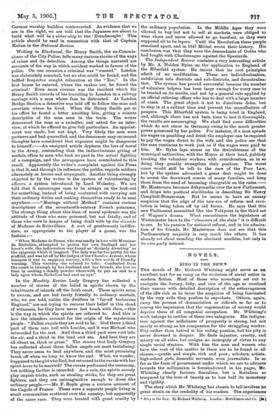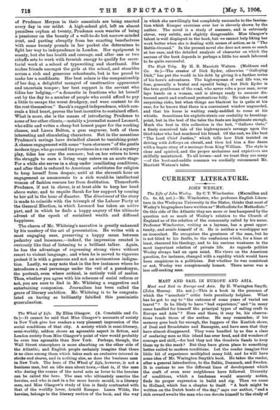NOVELS.
RING IN THE NEW.*
THE novels of Mr. Richard Whiteing might serve as an excellent text for an essay on the evolution of social satire in modern fiction'. Most of those who nowadays set out to castigate the luxury, folly, and vice of the age so overload their canvas with detailed description of the extravagances of the idle rich as to incur the suspicion of being fascinated by the very evils they profess to reprobate. Others, again, carry the process of denunciation or ridicule so far as to convey the impression that the regeneration of society would deprive them of all congenial occupation. Mr. Whiteing's work belongs to neither of these two categories. His indigna- tion against the selfishness of prosperity is strong, but not nearly so strong as his compassion for the struggling worker. Pity rather than hatred is his ruling passion, but his pity is never drowned in despair. He finds injustice, cruelty, and misery on all sides, but assigns no monopoly of virtue to any single social stratum. With him the men and women who have the root of the matter in them are to be found in all classes,—gentle and simple, rich and poor; scholars, artists, high-school girls, domestic servants, even journalists. In so far as the form of government under which we are to advance towards the millennium is foreshadowed in his pages, Mr. Whiteing clearly favours Socialism, but a Socialism so tempered by the love of beauty as to lose half its monotony and rigidity.
The story which Mr. Whiteing has chosen to tell involves no great strain on the credulity of his readers. The experiences • Ring in the New. By Richard Whiffing. London : Hutchinson and Co. Vial of Prudence Meryon in their essentials are being enacted every day in our midst. A high-school girl, left an almost penniless orphan at twenty, Prudence soon wearies of being a pensioner on the bounty of a well-to-do but narrow-minded aunt, and parting abruptly from her exacting benefactress with some twenty pounds in her pocket she determines to fight her way to independence in London. Her equipment is scanty, but she has health and courage, and after one or two rebuffs sets to work with feverish energy to qualify for secre- tarial work at a school of typewriting and shorthand. She makes friends amongst the girls at the school, and stumbles across a rich and generous schoolmate, but is too proud to make her a confidante. Her best solace is the companionship of her dog, a delightful mongrel of unattractive appearance and uncertain temper; her best support is the servant who tidies her lodging,—" a domestic in fractions who let herself out by the day to a number of people who could afford to pay a little to escape the worst drudgery, and were content to do the rest themselves." Sarah's rugged independence, which con- ceals a kind heart, proves the best incentive to sustained effort. What is more, she is the means of introducing Prudence to some of her other clients,—notably a journalist named Leonard, who edits and writes a cheap but honest paper for the working classes, and Laura Belton, a gem engraver, both of them interesting and stimulating characters. But in the meantime Prudence's savings have dwindled almost to vanishing-point. A chance engagement with some " barn-stormers" of the gentle modern type, who go round the provinces in a van with a mystery play, tides her over the summer ; but on her return to town the struggle to earn a living wage enters on an acute stage. For a while she serves in a shop under 'aumiliating conditions, and after that is reduced to American substitutes for religion to keep herself from despair, until at the eleventh hour an engagement as amanuensis to a rich would-be intellectual 'Woman of fashion rescues her from destitution. Thenceforth Prudence, if not in clover, is at least able to keep her head above water, and to requite Sarah for her support by coming to her aid in the hour of disaster. The clenoilnient of the story is made to coincide with the triumph of the Labour Party at the General Election, in which Leonard has taken an active part, and in which he finds a happy augury of the ultimate advent of the epoch of socialised wealth and diffused happiness.
The charm of Mr. Whiteing's narrative is greatly enhanced by his mastery of the art of presentation. He writes with a most engaging ease, preserving a happy mean between pedantry and looseness,—indeed, the impression created is curiously like that of listening to a brilliant talker. Again, he has the advantage of expressing strong views without resort to violent language ; and when he is moved to vigorous protest it is with a generous and not an acrimonious indigna- tion. Lastly, we may note that in the few instances where he introduces a real personage under the veil of a pseudonym, the portrait, even where critical, is entirely void of malice. Thus, whether you agree with his schemes of social reform or not, you are sure to find in Mr. Whiteing a suggestive and entertaining companion. Journalism has been called the grave of literary ambition. Mr. Whiteing is to be congratu- lated on having so brilliantly falsified this pessimistic generalisation.









































 Previous page
Previous page